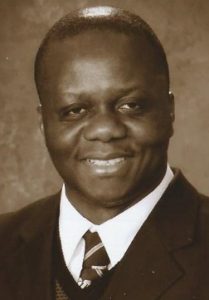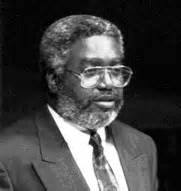Gabriel Baccus Matthews: Ten Years After
Joe Bartuah
Ten long years ago today, I received that most memorable call. It was exactly 3:17 p.m. Eastern Time. I knew who was calling; I had not talked with the gentleman on the phone for a while and so, I needed to answer his call, even though I had just arrived at my work-site. The gentleman at the other end of the line was Mr. Robert Sesay, my former co-worker at the NEW LIBERIAN newspaper prior to the eruption of the senseless war on Christmas Eve in 1989; he was calling from Philadelphia, Pennsylvania.
When I answered, what followed was, “Mr. Editor, have my sympathy for your man’s death.” I absolutely had no inkling of what Robert was talking about; the social media had not proliferated as it is now. Of course, I anxiously asked Robert, “Who died? What happened?” His shocking response was, “You haven’t heard about your man, Baccus Matthews’ death? Baccus died today in Monrovia!” And I screamed in a state of shock! My first instinct was to call Mr. Stephen Dah-Wula Quoikapor, a militant of the erstwhile Progressive Alliance of Liberia (PAL) in Trenton, New Jersey. When I called Mr. Quoikapor, I sensed that moment of a devastating loss from his voice and he confirmed that indeed, the father of multiparty democracy in contemporary Liberia, Honorable Gabriel Baccus Matthews had succumbed to the inevitable summons of death.
Losing Baccus at a relatively young age of 59 years was akin to losing a captain of a gigantic ship in a turbulent sea when berthing was still afar. On the 10th anniversary of his untimely passing, which occurred on September 7, 2007, I hereunder, republish the tribute I sent to multiple media institutions 10 years ago, because I strongly believe that most of the issues I raised at the time in eulogizing the fallen political sage are still relevant today, especially during this hectic campaigning process:

By Joseph G. Bartuah
A True Revolutionary Never Dies–A Tribute to the late G. Baccus Matthews
I am profoundly saddened in hearing about the untimely death of Honorable Gabriel Baccus Matthews, former Foreign Minister of my dear Republic of Liberia and Chairman Emeritus of the United People’s Party. Indisputably, Baccus Matthews was a gallant revolutionary stalwart of unmatched exponential influence, a venerable icon of multipartyism whose singular challenge of the True Whig Party (TWP) hegemony in the 1970s dramatically changed Liberia’s history once and for all.
On December 31, 1974, at the prime age of 26, and fresh from the City University of New York, when he convened a meeting of fellow young Liberians brimming with revolutionary fervor, they formed the erstwhile Progressive Alliance of Liberian (PAL) and unequivocally declared their intention to oppose the True Whig Party oligarchy, within the prism of the Liberian Constitution. In other words, unlike other political movements at the time, PAL did not beat around the bush.
When some doubting Thomases suggested the near impossibility of the Herculean task at hand because of the perceived formidability of the TWP, Baccus predicted that the TWP’s defeat was imminent because, ‘No little group of people can be stronger than a larger group of people’. After registering his intention to do what was then perceived as a sort of taboo, Baccus didn’t sit supinely in New York to proffer platitudes about breaking the yoke of a de facto one party system in Liberia, he took the political bull by its horn.
In 1977, 29-year-old Gabriel Baccus Matthews arrived in Monrovia and swiftly made his presence felt. He immediately sought audience with the Standard Bearer of the TWP at the time, President William Richard Tolbert, Jr. and duly informed him of his intention to organize a political party. By initiating that singular act, Baccus effectively sought to decriminalize a legal opposition to the Liberian presidency, an unfortunate blemish placed through chicanery and cruelty, on our political system by the Tubman autocracy, culminating in the cold-blooded murders of Senator S. David Coleman and his engineer son, John Coleman in 1955.
For Baccus, politics was a selfless public service, which must be transparently practiced within the public domain, for the maximum benefit of the downtrodden masses, rather than clandestinely engaging in activities that will eventually prove inimical to the detriment of the very people for whom such action was supposedly intended. As a result, the political movement and subsequently the political parties–Progressive People’s Party and the United People’s Party–he headed, always announced their planned political activities days before such actions were carried out.
Lest I be misconstrued, Gabriel Baccus Matthews was not a flawless person, if at all there is anyone so immaculate on the face of this planet. Like all mortal beings, Baccus was not infallible. There were times that he erred in his political activism, in terms of some public pronouncements and certain decisions he took. However, one thing is certain: Even some of his staunchest critics will reluctantly concede that he was an exceptional revolutionary who played a significant role in Liberia’s forward march towards the covetous culture of democratic pluralism. The emerging multiparty culture and economic regeneration that many of his critics seem to be relishing today, is gradually gravitating towards us because Baccus blazed the trail in post-Tubman Liberia.

It is also obvious that the political eminence he enjoyed among the grassroots populace for decades had some unintended liabilities. In many respects, he was one of the most misunderstood, misconstrued politicians of his time, despite the cogency and clarity of his cardinal message. In a society where illiteracy rate is conservatively estimated at 80 percent, where some of the few informed are prone to manipulate an opponent’s pronouncement just to render it ambiguous and confuse the uninformed, unlettered masses, it was not surprising.
But if Baccus was misunderstood, it is simply because there seems to be an innate tendency in the human race, perhaps due to our limitations as humans, to quickly reject what is best for our common humanity, only to accept it later. Historically, hasty condemnations and unwarranted denigration have been the common fate of reformists and revolutionaries alike,
You remember Moses, the eminent Jew who abandoned his royal privileges, just to extricate his brethren from the excruciating clutches of slavery? He was condemned, even by his own people! Haven’t you heard about William Tyndale, the Englishman who sacrificed so much so that most ordinary churchgoers would have access to the Holy Bible? He, too, was condemned to death! What’s about Jeanne d’Arc, the young French heroine whose unprecedented fortitude and gallantry saved a whole nation? She was declared a witch and incinerated! Even in 20th-century United States, Dr. Martin Luther King, Jr. was subjected to condemnations during his life time.
As we all pensively reflect on the passing of Mr. Matthews, all progressive democrats must take solace in the irrefutable notion that true reformists and revolutionaries never die, in spite of their transition from this physical world to the spiritual realm, because the ideals and philosophies they so passionately espouse and aspire to, tend to blossom and flourish long after their demise. Just as in the case of Moses, the Israelites never returned to Egypt; just as in the case of Tyndale, the Holy Bible is today one of the most published books in a myriad of languages with a universal access; just as in the case of Jeanne d’Arc, she was subsequently declared a saint, just as in the case of the American civil rights movement, Dr. King’s birthday is now federally celebrated, I harbor the conviction that future historians will favorably label the advent of Baccus Matthews on the Liberian political stage, especially in the late 1970s and the ’80s as the era of political enlightenment for multiparty democracy in that West African state.
To his thousands of admirers, he was simply called Baccus, because to them he was indeed, a great man who needed neither a lengthy title, nor tongue-wrecking names to introduce him. They reasoned rightly so that after all, the greatest man that ever lived was simply called JESUS.
I am certain that in keeping with tradition, a multitude of ordinary Liberians, students of history and government, friends and even foes whose cause he relentlessly championed, will strive to give Mr. Matthews a decent funeral that he so abundantly deserves, but in my view, the most indelible tribute we all can pay to the selfless soul of Gabriel Baccus Matthews is to robustly ensure that the distinctive flame of multiparty democracy which he heroically ignited three decades ago is not extinguished within the territorial confines of our common patrimony. Sleep well, Baccus, you fought a good fight!




